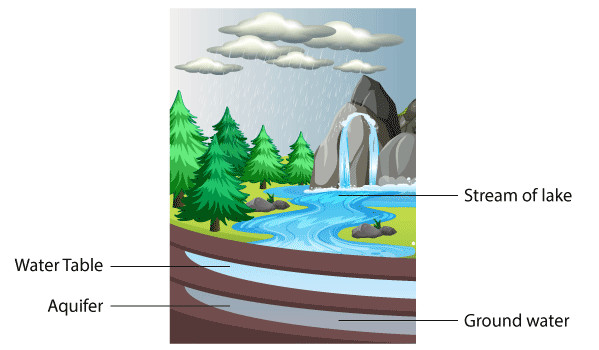NCERT Solutions Class 7 Science
The NCERT Solutions in English Language for Class 7 Science Chapter – 16 (Water: A Precious Resource ) has been provided here to help the students in solving the questions from this exercise.
Chapter – 16 (Water: A Precious Resource )
1. Mark ‘T’ if the statement is true and ‘F’ if it is false:
(a) The freshwater stored in the ground is much more than that present in the rivers and lakes of the world. (T/F)
(b) Water shortage is a problem faced only by people living in rural areas. (T/F)
(c) Water from rivers is the only source for irrigation in the fields. (T/F)
(d) Rain is the ultimate source of water. (T/F)
Answer –
(a) The freshwater stored in the ground is much more than that present in the rivers and lakes of the world. (True)
(b) Water shortage is a problem faced only by people living in rural areas. (False)
(c) Water from rivers is the only source for irrigation in the fields. (False)
(d) Rain is the ultimate source of water. (False)
2. Explain how groundwater is recharged.
Answer – The groundwater gets recharged through the process of infiltration. Infiltration means seeping of water from rivers and lakes into the empty spaces and cracks deep below the ground.
3. There are ten tubewells in a lane of fifty houses. What could be the long term impact on the water table?
Answer – If the people of the fifty houses use the ten tube wells, then the water required by them is drawn from the ground. If these tube wells are used for long time, then the ground water would be reduced and the water table would go down.
4. You have been asked to maintain a garden. How will you minimise the use of water?
Answer – To maintain a garden, water iS necessary. Therefore, to minimise the use of water, we can apply the drip irrigation meth0d. In this meth0d, water iS supplied directly to the base of the Plants using narrow pipes, thereby reducing the loss Of water.
5. Explain the factors responsible for the depletion of water table.
Answer – The factor responsible for the depletion of water table:
- Increasing industries – The higher the number of industries will require more water for their daily use, which will affect groundwater.
- Increasing population – The higher the number of individuals, the higher the need for daily use, which will lead to a decrease in the groundwater.
- Agricultural activities – In a way, an increasing number of agricultural fields will help the population but more number of the fields will lead to more irrigation systems.
6. Fill in the blanks with the appropriate answers:
(a) People obtain groundwater through________ and ________.
(b) Three forms of water are ________, ________ and ________.
(c) The water bearing layer of the earth is ________.
(d) The process of water seepage into the ground is called ________.
Answer –
(a) People obtain groundwater through tube wells and hand pumps.
(b) Three forms of water are ice, water and vapour.
(c) The water bearing layer of the earth is Hydrosphere.
(d) The process of water seepage into the ground is called infiltration.
7. Which one of the following is not responsible for water shortage?
(i) Rapid growth of industries
(ii) Increasing population
(iii) Heavy rainfall
(iv) Mismanagement of water resources
Answer – (iii) Heavy rainfall
8. Choose the correct option. The total water
(i) in the lakes and rivers of the world remains constant.
(ii) under the ground remains constant.
(iii) in the seas and oceans of the world remains constant.
(iv) of the world remains constant.
Answer – (iv) of the world remains constant.
9. Make a sketch showing groundwater and water table. Label it.
Answer –


Leave a Reply